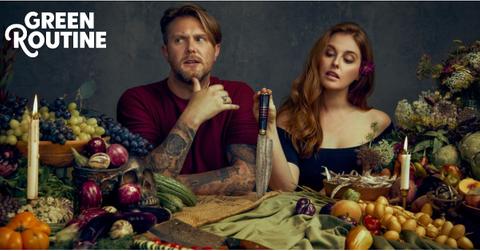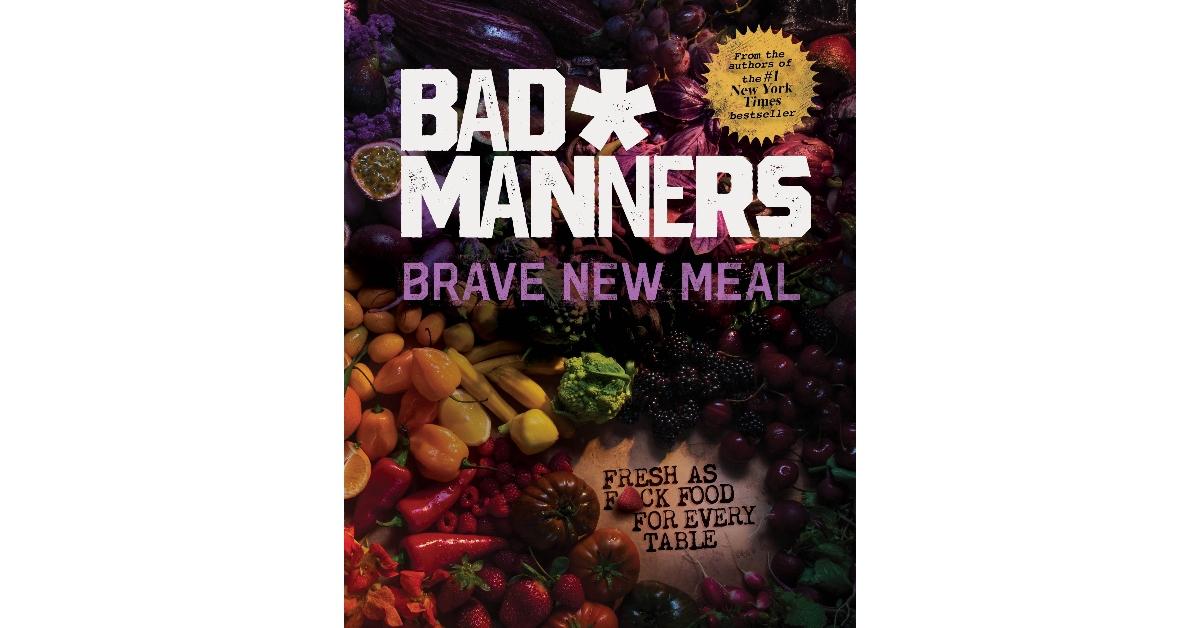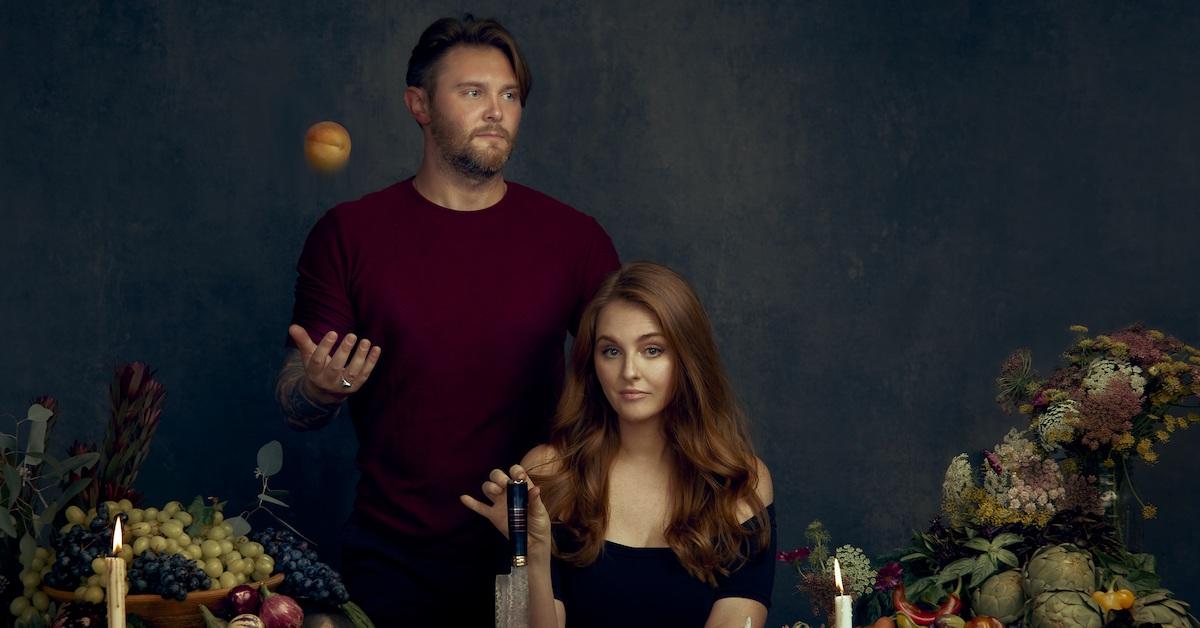The ‘Bad Manners’ (Formerly ‘Thug Kitchen’) Team On What Inspired Their New Cookbook (Exclusive)
Published Nov. 30 2021, 12:01 p.m. ET

Most meatless home cooks are familiar with Bad Manners (formerly known as Thug Kitchen). The hilarious duo behind the popular vegan cookbooks, Matt Holloway and Michelle Davis, released Thug Kitchen: The Official Cookbook: Eat Like You Give a F*ck back in 2014. They have since released countless books riddled with sassy language on catering vegan parties, and cooking quick family meals. Now, the Bad Manners team is sharing their Green Routine, and details on their latest book, Brave New Meal.
Brave New Meal, which was released Nov. 9, 2021, is the fourth Bad Manners cookbook. The foreword explains that after the start of the COVID-19 pandemic — which is both a health and environmental crisis — they wanted to focus on cooking using only local, seasonal foods. Not only does cooking this way taste better, but it slashes the impact of transportation emissions, and cuts down on importing costs. Therefore, it makes vegan eating much more accessible, and ultimately, more delicious.

Holloway, who is in charge of art direction, calls Brave New Meal "hopeful."
"We originally wanted it to be kind of a farmers market-like book. But that was when the world was not so f—d up, the world fell apart," he tells Green Matters. "And I think Michelle and I both wanted this kind of gritty beauty that I think you can see in a lot of the photography in the art direction that we chose it. We wanted it to feel hopeful, but also recognize it, things have shifted in the world is different now."
Davis, who writes the recipes, adds that it intentionally uses ingredients you can get anywhere. You can create anything from carrot and rice soup to beeteroni pizza, with solely local ingredients.
"Regular food that you can get at your grocery store, within your community, can be beautiful and crave-able," she explains. "You can eat intentionally with the seasons in mind and have superfoods and just be getting bell peppers and carrots. We wanted to glamorize and uplift everyday foods."
As pioneers in the world of vegan cookbooks, Holloway and Davis have incredible insight in the world of plant-based eating and sustainability. That's why we were elated they were able to sit down and share their Green Routine with us, via Zoom, below.
This interview has been edited and condensed for length and clarity.

GREEN MATTERS: What inspired you to become vegan and get into vegan cooking?
MICHELLE DAVIS: I went vegan in 2003, so I've been vegan a long-ass time. I had always just been one of those kids that didn't have the cognitive dissonance to watch Charlotte's Web and then have my mom's pork chops. And then, when I moved out of the house is when I went vegan, and it just seemed like such a natural progression for me.
I think the movement towards veganism that has been gathering so much steam, especially in the last 10 years, is really a reaction and a correction to how our current food system is. I think a lot of people who are vegan now wouldn't be vegan, necessarily, if we lived in an ethical food system. But we don't, that's not how we exist. You can't buy any sort of ethical animal products, really, especially if you live in a metropolitan area — it's just not possible. And it's not sustainable. It's not good for the planet. Until these huge factory farms don't exist. I don't know how you can ethically consume any type of meat product or animal product in this country.
MATT HOLLOWAY: I [went vegan] for health reasons. I don't know how much you know about us, but Michelle and I very briefly dated. And we broke up before the blog went viral, or we got our first book deal. We're, we're just brother and sister now — it's weird that we ever dated. But that being said, at the time, I was having a really bad indigestion. And Michelle was like, hey, your diet is kind of Red Bull and Hot Pockets. So I went vegetarian. And that helped almost overnight.
Then when I went vegan, and all my health problems disappeared. My acid reflux [went away], my skin cleared up. I started recovering when I would work out or when I would go running faster. We were just eating more mindfully. But the longer that I stayed vegan, the more reasons I had to be vegan and stay vegan. So when people are like, "what made you go vegan?" It's like, "What's making us not go vegan?" because, like Michelle was saying, industrial agriculture is so f—d up. There's there's a reason that these farms do these really polished commercials. Because if we knew where our food came from, nobody would eat it.
GM: What measures do you take while cooking to be eco-friendly?
MD: We have compost here at our office, which has been so amazing. We have an Earth Machine, and we've had that through all the books. And it's just so cool. Because obviously, I create a lot of vegetable waste. I've gotten tips and tails of every single vegetable going into this Earth Machine. And the fact that it just keeps going down.
It's just such an incredible connection to your food. And it just, it makes me cook a little bit more consciously to because I'm always just like, "Oh, the worms are gonna love this." Also our New Year's resolution at the beginning of this year was to get away from paper towels. And so we've been using a lot more reusable towels, and washing them, and all that. We were encouraging our podcast audience to do things like that as well. On top of I mean, ordering, obviously, less delivery, so we don't have all that Styrofoam.
People thought I was insane when I started bringing my own bags to the grocery store in 2004. In California, when I'm just like, always on canvas bags, everyone thought I was bonkers. And look where we are now. That's what everyone does. We can all make these changes. And it's not that hard.
MH: I'm sure that we could go through our entire process, from grocery shopping to plating a meal. We are constantly trying to be like, "how can I be more eco-friendly, less waste, no plastic? How can — what I don't use or I don't consume — put this back into the environment? We should we should sit down and make a list because I'm sure it's exhaustive. I'm sure a normal person would just be like, "You guys are insane."
GM: What is your biggest piece of advice for someone who's thinking about making their life more eco-friendly?
MD: Don't try to change overnight. People — just like with diets or anything else — go whole hog. They throw everything out in their house and it's just like, be honest with yourself. Let yourself make these gradual changes because that's how they stick. You change your lifestyle. If you go immediately and try to be like, "OK, I'm not gonna use these types towels, I'm going to go vegan, etc." And you can't make all those changes at one time, because then you're gonna fail. And then you're gonna be hard on yourself and you're not going to do it again. So just slowly make incremental changes over time. Then all of a sudden, in two years from now, you're not going to recognize your habits, you're gonna be living a different kind of life, because that's the intention you were putting out into the world and the choices you're making.
And eating seasonally is another great way for people to start paying more attention to where food comes from. Because why are you buying strawberries in December? They're gonna taste like s—t. They came from a bazillion miles away. Plus, it's such a pleasure to look forward to strawberry season.
MH: Yeah, that's a key one — especially when I was going vegan. A lot of people, when they get into something, they go 100 percent, and they just throw everything away.
And I have an odd one, that's outside of the kitchen: get a house plant. Just the process of growing it, and caring for it, and understanding your connection to this other thing that provides oxygen and beauty. You have this sort of symbiotic relationship with a living thing that is of the earth. I think that that makes people think differently in a lot of different avenues of our lives.
GM: What do you think is the biggest misconception about going vegan?
MH: It's seen as this really expensive elite predominantly white, American thing. But cultures around the world throughout space and time in recorded history have been predominantly vegan-vegetarian,
MD: Yeah, actually, the the lowest rung, I mean, that's what's accessible is grains, and non-animal based proteins. We don't cook with fake meats in any of our recipes. I mean, we think they're great for people transitioning, and we're really happy for everybody who enjoys them. It's just not to my taste. And I think their carbon footprint is something we'll start examining in a couple of years.
I want to keep it accessible. I want you to be able to get the ingredients for recipes at a Winn-Dixie, at a Food Lion, wherever you are. So it doesn't have to be expensive if you're buying $15 fake cheeses, and all these expensive fake burgers and chickens. That's how it's expensive. But beans and rice and broccoli have always been affordable. Right? And spices. Yeah, spices are vegan, y'all. That's flavor. Yeah. And once you buy them, you'll have them in your pantry for a while. It's a it's a small upfront investment for a year and a half or so of deliciousness.